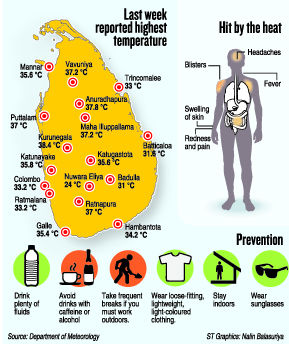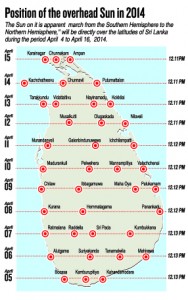News
Farming at standstill in north as skies stay dry
Agriculture in the north has come to a complete stop because of the lack of rain, an expert said this week as climatologists warned the current seasonal positioning of the sun directly over the island is intensifying the protracted heatwave.
Last week’s sporadic thundershowers might not soothe the scorched lands and hot conditions are expected to prevail.
Director (Forecasting) of the Meteorology Department, S.R.Jayasekare, said the worst affected areas are Vavuniya, Anuradhapura, Polonnaruwa, Moneragala, Mannar, Puttalam and Kurunegala, where the temperature ranged from 35-38C. On Friday, Mattala recorded the highest temperature of 37.7C.

From children to adults: Beating the heat with ice creams (above) and thambili drink (below). Pix by Indika Handuwala and Amila Prabodha
“In the recent past the highest temperature of 40 degrees has been reported from Vavuniya,” Mr Jayasekare said. “This year, a number of agricultural districts are experiencing a severe dry spell. The southern and western parts will receive rains in the coming weeks but the heat and moisture in the atmosphere will result in sweating and discomfort until May or June,” he said.
“Thanks to the Madden-Julian Oscillation, a planetary shift that brings rainfall over the warm region from the Indian Ocean to the western Pacific, our country will receive a little rain during the coming few days but this is not at all sufficient,” Mr. Jayasekare said.
Adding to the prevailing warm weather, the sun is positioned directly over the country from April 5-15. Boossa and Kamburupitiya were the worst affected areas yesterday. The sun will be over Aluthgama, Suriyakanda, Thanamalwila and Mahirawa today (April 6) and over Ratmalana, Sri Pada, Kumbukkan and Radella tomorrow (April 7).
The sun will then pass over Chilaw, Manampitiya, Valachchenai, Galenbindunuwewa, Nilaveli, Kokkilai, Katchchativu and Chunnavil and end in Karainagar, Ampan and Chunnakam on April 15.
Colombo University’s Professor of Geography, S. Anthony Norbert said while some rain might fall in the Western province other areas will continue to struggle with dry weather.
 “In the North, agriculture activities have come to a complete stop with water levels in tanks going below the rock formation. This time the north-east monsoon did not bring rains to the north-eastern areas of the country,” he said adding that despite being an island, the northern part of the country’s weather was similar to that of South Indian state of Tamil Nadu.
“In the North, agriculture activities have come to a complete stop with water levels in tanks going below the rock formation. This time the north-east monsoon did not bring rains to the north-eastern areas of the country,” he said adding that despite being an island, the northern part of the country’s weather was similar to that of South Indian state of Tamil Nadu.
“There has not been rainfall since last November and this trend may continue in the coming years with global warming and flares released by sun spreading the atmosphere creating extra heat. Agriculture experts should concentrate on designing and changing the present crop pattern in order to bear extremely long period of dry weather,” Professor Norbert said.
Additional Government Agent of Vavuniya, Saraswathie Mohananathan said the Economic Development and Disaster Management Ministries will be conducting drought assessment from Monday as Vavuniya is experiencing one of the hottest years on record.
“The chena cultivation is in big trouble. Farmers are complaining on losing large scale crop, 126,000 people in the district do not have sufficient drinking water as water sources have dried up,”she said.
Ms. Mohananathan said the Agriculture Department was conducting awareness programmes on crop change, especially long-term crops such as cultivation of limes and ladies fingers.
The Disaster Management Centre had allocated funds for drinking water and arrangements were being made to distribute drinking water.
“Dried lands have resulted in dust everywhere – most of the people here are suffering from coughs and severe respiratory illnesses,” she said.
The dry weather will also have an impact on human and animal health due to extreme dehydration.
Dr. U.M.M. Samaranayake, Director of Health Ministry’s Nutrition Division, said consumption of fluids should be increased.
“Drink more water, king coconut water and fresh fruit juice especially made from citrus fruits like lime and oranges. The intake of fruits such as watermelon and vegetables should be increased in order to retain vitamins and minerals lost due to excessive sweating,” he said.
Dr. Samaranayake said heat rashes such as prickly heat (miliria) were common during the warm months and that cold sponges and applying lotions with calamine could help soothe the discomfort.
“Cotton clothing is recommended and when going outdoors, sunglasses can protect eyes from the scorching sun rays,” he said.


